By Sayer Ji
Contributing Writer for Wake Up World
Did you know that the multi-billion drug category known as “acid blockers,” despite being used by millions around the world daily, may not work as well as the humble ginger plant in relieving symptoms of indigestion and heartburn?
Ginger is a spice, a food, and has been used as a medicine safely for millennia by a wide range of world cultures. Research on the health benefits of ginger is simply staggering in its depth and breadth. In fact, the health benefits of ginger have been studied extensively for over 100 health conditions or symptoms, making it one of the world’s most versatile, evidence-based remedies.
The biomedical literature on acid blockers, on the other hand, is rife with examples of the many adverse health effects that come with blocking stomach acid production with xenobiotic, patented drugs, i.e. proton pump inhibitors and H2 antagonists. What started out as “heartburn” – which in its chronic form is now called “acid reflux” or “gastroesophageal reflux disorder” – soon becomes stomach acid barrier dysfunction, when these drugs remove the acid which protects us from infection, helps to break down food, and facilitate the absorption of minerals and nutrients.
The list of 30+ harms is extensive, but here are a few of the most well-established adverse effects you may not be aware of:
- Clostridium Infections
- Diarrhea
- Pneumonia
- Bone Fractures
- Gastric Lesions and Cancer
Back to our friend – our “plant ally” – ginger. What happens when Pharma meets Farm in a biomedical face-off? When acid-blocking drugs are compared in efficacy to our little spicy ginger root? Well, this is what the journal Molecular Research and Food Nutrition found back in 2007 …
Titled, “Inhibition of gastric H+, K+-ATPase and Helicobacter pylori growth by phenolic antioxidants of Zingiber officinale,” the study set out to determine the anti-ulcer and anti-Helicobacter plyori (a bacteria commonly implicated in ulcer formation) capacity of ginger extracts versus conventional acid-blocking agents, such as lansoprazole (trade name Prevacid).[i] Researchers found that one fraction of ginger exhibited six- to eight-fold better potency over lansoprazole at inhibiting acid production (specifically, gastric cell proton potassium ATPase activity).
But, this was not all. Ginger was also found to have potent antioxidant properties, protecting both lipids from peroxidation (rancidity) and DNA damage, leading the researchers to conclude that specific fractions within ginger have “potential in-expensive multistep blockers against ulcer.”
While this study focused on specific isolates of the whole ginger plant, it must be remembered that whole plants are not drugs, nor should be reduced to “nutraceutical” magic-bullets in order to become new palliative drug alternatives, which is to say, symptom-repressors, leaving the real healing job of changing the underlying nutritional, environmental, emotional context to lead to the problem in the first place, unchanged.
While taking a ginger pill is usually a better choice than a chemical one, for most folks, ginger should be consumed in whole forms, in moderate and balanced quantities, along with a nourishing, organic, whole-food and traditional foods diet, in order to move beyond the paradigm of popping pills, or proprietary fractions of herbs in order to balance out the pendulum of extremes.
Either way, I think its time with awaken from the sorcery-like spell of pharmacia (Greek word meaning: drug, potion, charm, spell, poison), and realize everything we already need is likely in our backyard, our refrigerators or cupboards – if not altogether within ourselves.
Additional Relevant Research:
Water Extinguishes Stomach Acid 175x Faster Than Some Drugs
[i] Mugur N Siddaraju, Shylaja M Dharmesh Inhibition of gastric H+, K+-ATPase and Helicobacter pylori growth by phenolic antioxidants of Zingiber officinale. Mol Nutr Food Res. 2007 Mar;51(3):324-32. PMID: 17295419
About the Author
Sayer Ji is the founder and director of GreenMedInfo.com and co-author of the book The Cancer Killers: The Cause Is The Cure with New York Times best-seller Dr. Ben Lerner and Dr. Charles Majors. His writings and research have been published in the Wellbeing Journal, the Journal of Gluten Sensitivity, and have been featured on Mercola.com, NaturalNews.com, Reuters.com, GaryNull.com, Infowars.com and Care2.com.

If you've found value in our articles, we invite you to support the release of our brand-new book, "Gratitude Practices for Kids: A Practical Guide for Adults to Instill a Spirit of Appreciation and Positivity in the Next Generation."
"Gratitude Practices for Kids" brings together over 25 innovative and accessible practices designed to enhance gratitude in everyday life. This comprehensive guide is backed by 17 scientific studies, ensuring each concept is grounded in research, underscoring our commitment to nurturing growth, emotional intelligence, and positive interactions between adults and children.
We encourage you to opt for the paperback version to celebrate this new release. Dive into its fresh pages away from digital distractions, allowing you to immerse yourself in the transformative practices it offers.
Over recent years, Wake Up World has faced significant online censorship, which has impacted our financial ability to operate. Moving into book publishing represents a strategic step to secure the ongoing funds needed to continue our mission. By purchasing Gratitude for Kids, you help us keep our content free and accessible to everyone, avoiding needing a paywall. With over 8,500 articles published in the last 13 years, we remain dedicated to keeping our valuable content open to all.
Disclaimer: This article is not intended to provide medical advice, diagnosis or treatment. Views expressed here do not necessarily reflect those of Wake Up World or its staff.








